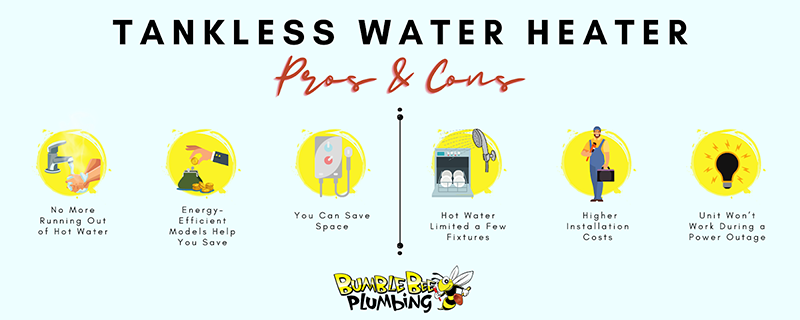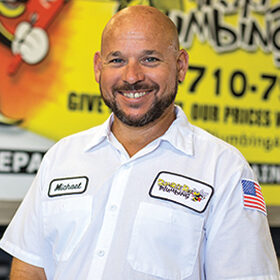Is your current water heater on its last legs? If you’re thinking about getting a replacement, you have a big decision to make—do you stick with a tank water heater or upgrade to a tankless unit?
Before you invest your hard-earned money, let’s dive into everything you need to know about tankless water heaters. How do tankless water heaters work? What are their pros and cons? All of these questions will be answered below! Then, when you’re ready, contact the Bumble Bee Home Services team for a tankless water heater installation in Phoenix, AZ.
How Does a Tankless Water Heater Work?
A tankless water heater might sound too good to be true—but it’s not! If you’re wondering how a tankless water heater works to provide on-demand hot water, it’s very simple.
Tankless water heaters use a heat exchanger, powered by either electricity or natural gas, to heat water as it flows from the supply pipe to the faucet. The result is instantaneous hot water, comfort, and convenience.
Since the water is heated on demand, tankless units don’t require a storage tank. This helps eliminate standby heat loss, a common problem for tank water heaters that contribute to wasted energy (and, therefore, wasted money).
Tankless Water Heater Pros and Cons
Now that you know how a tankless water heater works, let’s take a look at some advantages and disadvantages. Then, you can decide whether this system is right for you!

Pro: No More Running Out of Hot Water
The most important thing you need to know about tankless water heaters is that they can provide an endless supply of hot water. No need to worry about cold showers any longer!
Con: Hot Water May Be Limited to Only a Few Plumbing Fixtures
Unfortunately, even these cutting-edge systems have their limitations. Depending on the model and size of your unit, you may not be able to run every appliance at once. For example, if you have the dishwasher, laundry machine, and dishwasher on, you may experience fluctuations in the water temperature as the tankless water heater struggles to supply hot water to all outlets.
An easy fix for this dilemma is to install multiple tankless units to handle all of your household’s hot water needs.
Pro: Energy-Efficient Models Help You Save
The beauty of tankless water heaters is that they are extremely energy efficient. The U.S. Department of Energy reports that tankless systems are 24-34% more efficient than their tank counterparts. Imagine how much you can save on energy bills within the year!
Con: Tankless Water Heaters Have Higher Installation Costs
Cost is probably the number one thing most homeowners need to know about tankless water heaters.
Both the water heater installation and the unit itself cost more upfront—but the number of benefits they offer can offset the cost. Most homeowners agree that these systems pay for themselves within a few years.
Some notable benefits are energy savings and increased lifespan; most tankless units can last upwards of 20 years with regular care and maintenance.
Pro: You Can Save Space
If your home is small or cramped, a traditional water heater may not be right for you. The tank takes up a lot of space before even factoring in the 12 inches required for the clearance area.
Tankless water heaters, on the other hand, are small and can be installed virtually anywhere!
Con: Your Unit Won’t Work During a Power Outage
Do you live in an area that experiences frequent power outages? Be prepared to survive without hot water during the blackout. All tankless water heaters need electricity to run, even gas models. Without power, the gas burner won’t function properly and, as a result, you will only have access to cold water from the supply pipe.
Ready to Upgrade? Turn to Bumble Bee Home Services!
Now that you’ve learned everything you need to know about tankless water heaters, you can reach out to our comfort consultants for more information about upgrading. We carry the leading brands, and we’ll give you our professional recommendations for which system we believe is best for you. Contact us to schedule an installation for your new tankless water heater in Phoenix.


